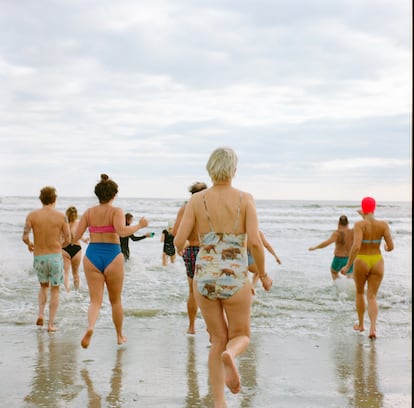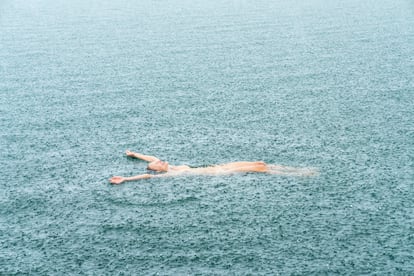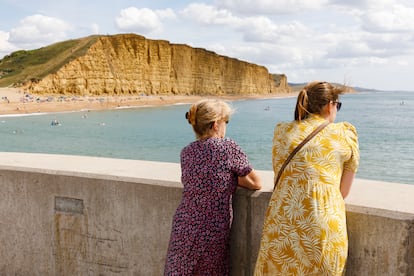Liquid animals: Why getting into water feels so good
Humans have been experiencing the benefits of bathing and swimming for millenia. However, until very recently, science hadn’t studied this in detail

We don’t know why, but we like to feel inundated by the idea of water and its strange — almost magical — company. Sometimes, we don’t even need to touch it… simply remembering it is enough. “Take me to a soft land of waters,” wrote the Chilean poet Gabriela Mistral.
Many of us have aquatic memories. A research project by the University of Sussex asked 20,000 people to record their feelings at different times throughout their lives. The result was that an overwhelming majority associated their happiest moments with water. The childish wonder at the yellow and blue beach; laughter and flirtations on a boat on the high seas; kisses in the water, a touch of salt, or a stroll along the waves. “Took a ride on the ocean / Started swimming out / Lost sight of land,” sings the Australian punk band Radio Birdman, in their song Descent into the Maelstrom. It’s based on the 1841 short story of almost the same name by Edgar Allan Poe.
We recall raw fragments of our lives when we look at old coasts or new seascapes; when we contemplate the water from a beach in the South of Spain, the Malecón in Havana, or the Danish sandbanks facing the Baltic Sea. Just by looking at the sea, we’re already different.
It’s said that our old love affair with water has a lot to do with the memory of the refuge in our mother’s womb. The British philosopher Alan Watts warned us: “You didn’t come into this world. You came out of it, like a wave from the ocean. You are not a stranger here.” Between heaven and earth, we are border creatures who feel united in the infinite transmutations “of the living sea of the great world,” as we read in The Book of Water and Fire, by Spanish art historian Raimon Arola.
We believe ourselves to be creatures of the countryside, mountains, or the city. But water is also our territory. In water, “you immerse yourself in another dimension where other, more elemental values rule. And, while we struggle to stay afloat, we recover our forgotten condition as animals,” explains María Belmonte, author of The Murmur of Water, during a phone call with EL PAÍS.
Blood and sodium
We are one of the many forms of water. Embracing it is a purifying blessing. “Each of us carries in our veins a salty stream in which the elements sodium, potassium, and calcium are combined in almost the same proportions as in sea water,” writes the American marine biologist Rachel Carson in The Sea Around Us (1951).
We come from the oceans and “that’s why submerging ourselves restores us,” says Easkey Britton, a PhD in Environment and Society from the National University of Ireland, via video call. “When we get into the water — especially if it’s cold — we feel very good. It helps us connect with others and with ourselves,” she adds. After a sea bath, we’re more present and less distracted. “We experience a kind of reset of the nervous system,” according to Britton, the author of Ebb & Flow: Connect with the Patterns and Power of Water (2023).

Our health — both physical and mental — is intrinsically linked to nature. Humans have known about the healing power of water for millennia, but until recently, this hadn’t been studied in depth by Western science. Now, the loss of human interaction with open spaces is linked to mental disorders. And new research shows that spending time near water — in, in front of, or on water, be it the sea, the coast, a river, lake or pond — is a great restorative. Simply looking at water reduces your blood pressure and your heart rate. It causes rapid, beneficial psychological and physiological changes in salivary cortisol, blood flow and brain activity.
These studies by Britton and other researchers confirm that the presence of water reduces stress, anxiety and depression. “Water helps us improve our physical and mental state. It somehow brings us back to awareness of our body,” explains Easkey, who is also one of Europe’s best surfers. Her father gave her her first surfboard when she was four… and her name means something like “abundant fish” in Gaelic.
Water calms us. When we come into contact with it, our neural connections react, taking us into a state of sedation that marine biologist Wallace J. Nichols calls “blue,” as he details in his book Blue Mind (2015). When we’re in the water, our feel-good neurotransmitters go off. Endorphins give us a feeling of euphoria, while dopamine offers us a sense of novelty and reward. Oxytocin gives us a feeling of confidence and warmth, and serotonin gives us a boost of relaxation and satisfaction. This is the concept of blue therapy… the idea of immersing ourselves in blue spaces. Spending time in such spaces also benefits us, because it encourages physical activity, socializing, and improving our creativity and self-awareness.
That’s why, after a good dip, we feel peace and a wonderful sense of unity with the environment. And, at the same time, we feel toned, with renewed energy. It’s as if we’ve restored our body and mind, as if we’re living a new beginning. As if we’re wearing new skin.
Dinosaurs in the rain
It’s not easy to unravel the aquatic mystery. From science, we know that, for four million years, there’s been the same amount of water on planet Earth. And that “same” water also refers to the fact that it’s exactly the same element that already rained down on the backs of the dinosaurs.
What we don’t know is how the water reached our planet. Perhaps it was a meteorite. Or perhaps, billions of years ago, the planet cooled so much that the vapor ended up condensing in the form of water. What’s known is that for seven-eighths of the history of life on our planet, it has existed and developed exclusively in the sea, where sponges, worms, jellyfish, corals and arthropods emerged. And it wasn’t until less than 600 million years ago that the first organisms — for whatever reason — left the water and began to populate the land.

“The ancestors of whales lived on land. Other animals did, too. But after a while, many ended up returning to the ocean. It’s a scientific thing. But it’s also a very poetic image, right? It shows the extraordinary attraction of the sea,” says Patrik Svensson, in a phone interview with EL PAÍS. A Swedish writer, he’s the author of The Blue Marble (2022).
The sea and life on Earth have a history of four billion years, while rational human beings were born approximately 200,000 years ago. To give us an idea, “if the Earth were only one-day-old, Homo sapiens would have existed for four seconds,” Svensson explains. That’s why the influence of water on us is totemic. Because we come from it and live surrounded by that element. It’s clear from the famous NASA photo published on Christmas of 1972. The first image of the planet seen from the outside — the most-shared photograph in the world — is a small, blue marble. Warm, iridescent and alive, floating in a blanket of darkness and space cold. “How inappropriate to call this planet ‘Earth,’ when it is clearly Ocean,” observed the writer Arthur C. Clarke.
The truth is that we live in a large container of H₂O, full of mutant plants and animals that are also — in a multitude of shapes and sizes — containers of water. Just like us. We’re largely made of the material that gives us so much calm. At birth, 80% of our body contains water, a figure that decreases to 60% in adulthood.
Cells contain 60% of all water in the body, with roughly 20% of the remainder surrounding the cells. 10% is in the blood and another 10% is in the organs. And 95% of our eyes, 80% to 90% of our blood, 70% to 85% of our heart, lung, kidneys and liver — along with 75% of our skin and 22% of our bones — are made of water. Perhaps that’s why, when we swim and dive off the coast, near a beach, we feel complete.
“Researching the sea has made me realize how vulnerable the ocean is. I also thought that the sea was an infinite resource… so powerful and large that nothing can affect it. But that’s not true. It must be taken care of,” reflects Svensson, from the coast of Malmo, Sweden.
It’s estimated that between two and three billion fish are killed annually, of which only a small proportion reaches the table. This is because the vast majority of fish are caught to be transformed into animal feed. We should pay attention to what we want, but we must also preserve — from unchecked exploitation — what gives us so many physical and mental benefits.
Coasts, beaches and oceans must be protected. And not only for the ecosystem itself, but for everything it offers and contributes to us on a personal and social level. During these days of rest, submerged in the water, between swims — while contemplating beaches, rivers and lakes — perhaps we’ll better understand the English poet Philip Larkin, when he said that, if he had to create a religion, it would be one that would idolize water.
Even democracy has to do with water
Water provides us with a multitude of physical and mental benefits. In addition, the vast majority of the world's population lives near it. Seas, lakes and rivers have been our main natural infrastructures. Beyond that, the liquid element is also the symbolic structure that, over the centuries, has led human groups to unite or fight.
In Water: A Biography (2022), the Italian-British scientist Giulio Boccaletti explains that it was the need to organize to gain access to water that initiated the development of rules of coexistence, morals and politics, as well as many of the human cultures. In the West – particularly in ancient Greece and in the Roman Republic – it was decided communally how water would be distributed, because abundant rains, drought problems, or floods are issues that transcend the individual. Therefore, the history of irrigation systems is the history of power and its distribution.
In Spain, the Water Tribunal of the plain of Valencia – popularly known as the Tribunal of Waters – still debates and manages the uses of the waters of the Turia River and its irrigation ditches, which Valencian orchards depend on. This thousand-year-old tribunal – inaugurated in the times of Abd al-Rahman III, during the Caliphate of Córdoba — is made up of democratically-elected trustees, who give the water legal value. They’re the representatives of the gardening communities: they must be farmers, direct cultivators of the land, or landowners. For this reason, traditionally, the people considered to be the wisest and with the greatest knowledge of the land, the orchard and the ups and downs of the water are chosen.
There’s much to do. Half of the world’s population has only had full access to water for less than a century. And today, as before, we must also organize around water — fresh, as well as salt water – and reflect on how to live with respect to it. To do this, it’s important to know more, much more, about our planet. We know more about Mars than about the oceans, because we’ve only explored less than 10% of our seas. 90% of the underwater realm remains a dark mystery to us.
Sign up for our weekly newsletter to get more English-language news coverage from EL PAÍS USA Edition
Tu suscripción se está usando en otro dispositivo
¿Quieres añadir otro usuario a tu suscripción?
Si continúas leyendo en este dispositivo, no se podrá leer en el otro.
FlechaTu suscripción se está usando en otro dispositivo y solo puedes acceder a EL PAÍS desde un dispositivo a la vez.
Si quieres compartir tu cuenta, cambia tu suscripción a la modalidad Premium, así podrás añadir otro usuario. Cada uno accederá con su propia cuenta de email, lo que os permitirá personalizar vuestra experiencia en EL PAÍS.
¿Tienes una suscripción de empresa? Accede aquí para contratar más cuentas.
En el caso de no saber quién está usando tu cuenta, te recomendamos cambiar tu contraseña aquí.
Si decides continuar compartiendo tu cuenta, este mensaje se mostrará en tu dispositivo y en el de la otra persona que está usando tu cuenta de forma indefinida, afectando a tu experiencia de lectura. Puedes consultar aquí los términos y condiciones de la suscripción digital.









































